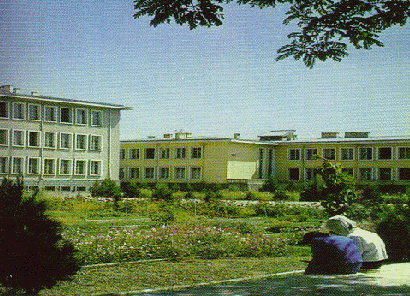
Kabul University is the major educational institution in Afghanistan. It was founded in with the establishment of the school of medicine with French and Turkish professors. Faculties of law and political science (, natural sciences (, economics (1957), home econics (1962), education (1962) engineering (1963), and pharmacy (1963) were eventually added. The University was inaugurated officially in 1946, when a president wwas appointed by the ministry of education and an academic senate was formed. In 1965, a university law was passed which provided for automonomus governmance under an elected president.
In the 1960s, Kabul University became a center of political discourse and a training ground for cadres of the entire political spectrum. About half the student body lived in dormitories on campus. The leadership of the Islamist, Leftists, and nationalist parties emerged from its campus, where they would hone their oratorial skills and engage in verba and often physical violence. Therefroe, the Afghan government in 1968 banned political activities on campus. In 1976 the number of students in this establishment was 8500 people and , in 1990, is said to be composed seventy percent of women. of 800 teachers in the 1970s only 350 remained in the late 1980 because of Civil War in the country.Politics has interfered in admissions and academic polices after events of 1978.
President Njibullah proclaimed a "new educational policy" in 1990 which dispensed with much of the previous radical governments innovations.
Source: Ludwig W. Adamec. " Historical Dictionary of Afghanistan." The Scarecrow Press Inc. New Jersy, 1991.
For More Information See: Afghanistan Educational Systems
|
Source: Latest Population Census & Statistics, Kabul, 1979. |
Kabul University After the War
Kabul University Rehabilatation Project
University of Mazar-i-Sharif
University of Ningarhar
Kabul Politechnique Institute
Afghanistan Educational Web Site is The Best Site for All Information You Need. Your Comments and Questions: webmaster@msamizay